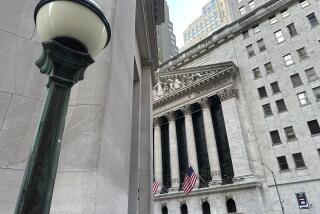Wall Street Starts Off New Year on a Downer
Stocks suffered a pounding Tuesday as more investors decided the turn of the calendar was a good reason to take profits.
The selling was fueled in part by a jump in interest rates, after the minutes of the Federal Reserve’s December meeting showed that some policymakers were worried about inflation and “potentially excessive risk-taking” in markets.
Higher oil prices and the assassination of Baghdad’s governor also hurt market sentiment.
The Dow Jones industrial average sank 98.65 points, or 0.9%, to 10,630.78, bringing its loss in the year’s first two trading days to 1.4%. The decline has wiped out nearly half of the Dow’s 3.2% net gain for all of last year.
Technology and small-company stocks have been hit hardest in the new year’s sell-off. The tech-heavy Nasdaq composite index slumped 44.29 points, or 2.1%, to 2,107.86 on Tuesday, its biggest one-day loss since Aug. 6.
Including a pullback Monday, Nasdaq’s 3.1% drop this year has erased its December gain. For all of 2004, the index rose 8.6%.
The blue-chip Standard & Poor’s 500 index fell 14.03 points, or 1.2%, to 1,188.05 on Tuesday.
Several analysts said the market was primed for a pullback because major indexes had marched higher with few interruptions since late October.
Some investors might have thought about taking profits late last month but decided instead to book their gains in 2005 for tax reasons or other considerations, said David Garrity, market strategist at investment firm Caris & Co. in New York.
“I think you’re seeing a bit of deferred profit taking,” he said.
Still, the Fed provided a solid excuse for sellers Tuesday: The minutes of the central bank’s Dec. 14 meeting, released earlier than in the past under a new Fed policy, indicated that some officials believed inflation pressures were building in the economy.
Those concerns spooked the bond market, analysts said. Higher inflation would eat away at bonds’ fixed-rate returns and could force the Fed to raise its benchmark short-term rate at a faster pace.
Yields on shorter-term Treasury securities, which tend to be highly sensitive to Fed rate moves, jumped Tuesday after the central bank’s meeting minutes were released.
The two-year T-note yield rose from 3.09% on Monday to 3.19%, a 2 1/2-year high. The 10-year T-note yield, a benchmark for mortgage rates, rose from 4.21% to 4.28%.
The Fed’s minutes also may have had a sobering effect on investors because of a reference to “signs of potentially excessive risk-taking.” The context was whether low interest rates were encouraging speculation in financial and housing markets.
That may have reminded some investors of the stock market bubble in 2000, which was powered by wild speculation in technology shares.
Patrick Connors, a trader at Greenwich Prime Trading Group in Greenwich, Conn., said the Fed’s wording added to his concern that the market’s bounce in November and December was nothing more than a relief rally after President Bush’s reelection.
“It was fluff,” he said of the advance. Forced Tuesday to focus again on substantive issues -- including Iraq, after the assassination of Baghdad’s provincial governor by insurgents -- investors retreated, Connors said.
But others said the new year’s losses in stocks haven’t changed the outlook for the market.
Given expectations for economic growth and rising corporate earnings in 2005, “we’re still constructive on the market,” said Jason Trennert, strategist at investment firm ISI Group in New York. “To me, stocks are far more attractive than bonds.”
Among the day’s highlights:
* Falling stocks outnumbered winners by 3 to 1 on the New York Stock Exchange.
* A rebound in oil prices added to investors’ concerns. Near-term crude futures in New York rose $1.79 to $43.91 a barrel after Saudi Arabia said it was making good on a previous pledge to trim production.
* The dollar was the day’s big winner, bolstered by rising interest rates and by the government’s report that factory orders surged in November. The euro tumbled to a two-week low of $1.327 from $1.348 on Monday.
* Technology shares retreating included Sun Microsystems, which plunged for a second day amid negative comments by Wall Street analysts. Sun slid 48 cents to $4.63.
Other tech losers included Dell, which dropped $1.27 to $40.52 after brokerage Raymond James downgraded the stock from “outperform” to “strong buy”; and Amazon.com, which lost $2.38 to $42.14 on a downgrade to “sell” from “hold” by brokerage Smith Barney.
* Smaller stocks, strong performers in 2004, fell sharply. The Russell 2,000 index sank 1.9%. It has dropped 3.5% this year after gaining 17% last year.
* Builders’ shares were hurt by rising interest rates. KB Home of Los Angeles slid $4.76 to $99.14. Newport Beach-based William Lyon Homes fell $2.65 to $67.15. Lyon said Monday that fourth-quarter new orders fell 35% from a year earlier.
* Airline shares, big gainers in the fourth quarter, slumped. Continental lost $1.76 to $12.20; Northwest slid $1.31 to $9.64.
* Los Angeles-based apparel firm Guess bucked the market trend, rising $1.36, or 11.4%, to $13.34 after brokerage Piper Jaffray recommended the stock.
More to Read
Inside the business of entertainment
The Wide Shot brings you news, analysis and insights on everything from streaming wars to production — and what it all means for the future.
You may occasionally receive promotional content from the Los Angeles Times.










